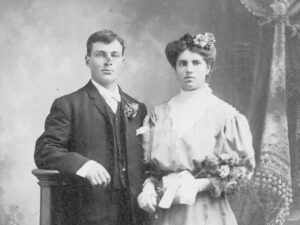
Women’s health nurse practitioners Ivy Emery and Andrea Zimmerman of Harmoni Wellness. Photo: Blueroom Productions LLC
The team behind Harmoni Wellness discusses the transitional period before menopause.
For many women entering their perimenopausal years, it can feel like their body has gone haywire. From loss of libido and anxiety to memory problems and vertigo, there are a host of symptoms associated with the changing hormone levels of perimenopause.
“It can be a confusing time for women to understand what’s going on with their health,” Ivy Emery says.
Emery is on a mission to normalize conversations about women’s health as it pertains to perimenopause. Together with fellow board-certified women’s health nurse practitioner Andrea Zimmerman, the duo started Harmoni Wellness in Plymouth. The clinic is focused on filling the gaps in women’s health care, including perimenopause.
Emery and Zimmerman share their knowledge about perimenopause.
What is perimenopause?
At its most basic level, perimenopause means “around menopause.” It is the period of time in a woman’s life during which her body begins its transition to menopause and the close of the reproductive years. “It’s not a light switch,” Emery says. “There’s a complicated journey before that.”
What are the symptoms?
One of the first perimenopause symptoms many women might experience is a hot flash or a flush. As early as in their mid-30s, women might also begin to notice irregularities in their menstrual cycles. Other symptoms of perimenopause include anxiety, brain fog, depression, ear ringing, heart palpitations, loss of libido, memory problems, mood swings, painful intercourse, panic attacks and vertigo.
What is the typical age range for women in perimenopause?
Perimenopause can start “easily 10 years before menopause,” Zimmerman says. With the average American woman going through menopause at 51, it is not uncommon for women to begin perimenopause in their early 40s, though some women will start noticing symptoms in their mid-30s. African American and Latina women tend to experience symptoms earlier than average, as do people who have had an ablation (such as a partial or full hysterectomy) and people who smoke. According to Emery and Zimmerman, the best indicator for when a woman can expect to go through menopause is to determine when her mother began to experience symptoms.
What can women do to help their bodies navigate it?
Attention to diet is important for perimenopausal women. Increasing protein and fiber while decreasing the intake of alcohol, processed foods and sugars can help ease symptoms and manage weight. Women should also focus on getting regular exercise, practicing good sleep hygiene and seeking sunshine. “Being outdoors is good for us,” Emery says.
What are common misconceptions?
“A lot of people say, ‘I’m not there yet,’” Zimmerman says. “You’d be surprised. We know perimenopause can start between 35 and 45 years old. When we start to talk about the 34 plus symptoms that have been documented for perimenopause and menopause, people start to [say], “Oh, I do have that. Oh, that is me.”
Zimmerman says outdated medical information also persists. “They’re also told, ‘If you’re still having a period or if you’re having any kind of cycle, we’re going to wait. We’re going to wait until 12 months to start the hormone therapy.’” This means women could potentially be struggling with perimenopausal symptoms for years before they get any relief, Zimmerman says.
Is there a test that indicates perimenopause?
Having a hormone panel done can help indicate the likelihood of perimenopause as hormones decline unevenly during perimenopause and menopause. However, Zimmerman says they don’t diagnose off of a hormone panel alone. “Your hormones today will look different tomorrow, and that’s true every single month. So we don’t diagnose perimenopause based on lab [results]. We diagnose based on symptoms and the patient’s age and health,” she says.
What treatments are available?
Haromoni Wellness offers an array of treatments, including counseling, bioidentical hormone therapy, weight loss management and services to repair and rehabilitate pelvic floor, vaginal and bladder tissues that decline due to loss of estrogen. “We also have a free, no-obligation consultation that people can book online [where] we just talk about what is going on with them, what matters to them and then how does one proceed,” Emery says.
When should someone seek treatment for perimenopausal symptoms?
“As soon as they begin to feel that they’re not themselves or that the symptoms are becoming a problem,” Zimmerman says.
To this end, Emery says Harmoni Wellness is developing a resource page to help women understand what’s happening to them. “There is a lot of information out there, and new information that keeps coming,” she says. They also recommend The New Menopause by Mary Claire Haver, M.D. “Finding someone that they trust to be able to get good information that’s current is really essential,” Emery says.
Consult your primary care physician or other qualified healthcare provider with any questions regarding a medical condition or treatment.
Harmoni Wellness
3021 Harbor Lane N. Suite 214; 612.887.2186
Facebook: Harmoni Wellness
Instagram: @harmoniwellnessmn





















